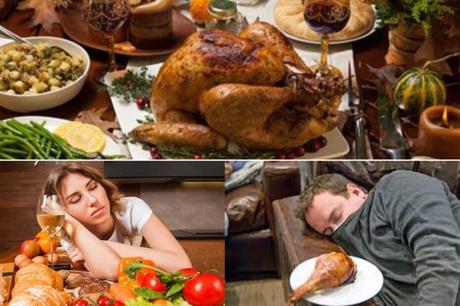
What is Turkey Coma?
In the event that you're one of the Americans who consume a portion of the almost 46 million turkeys eaten in the U.S. every year on Thanksgiving, you're presumably acquainted with "turkey coma."
Whether you had only one plate or two, many might encounter a mind-boggling sensation of sleepiness after the Turkey Day feast that may not appear to be equivalent to some other dinner of the year. In any case, the drained inclination isn't simply some peculiarity. There's a justification for why individuals are left needing to get into bed after the fabulous gala.
You might have consistently accused the customary principal dish as the guilty party behind the sensation of sleepiness, yet turkey isn't the sole suspect behind that lethargic feeling, registered dietician and nutritionist Nancy Farrell Allen says.
Is turkey coma real?
Those sensations of post-turkey supper tiredness are too familiar.
The turkey, stuffing, potatoes, and carrots, combined with the delectable sweets of the fall season - pumpkin pie and everything apple. Stretchy jeans and post-supper rests are as much a piece of numerous turkey meals as cranberry sauce and pie.
However, is that inescapable post-supper nap (as often as possible known as the "turkey extreme lethargies") genuine?
According to the Applied Human Nutrition alumna and presently Lab Teacher and Exploration Collaborator Antonia Harvey to process the point.
What is tryptophan?
While Allen says turkey doesn't merit all the recognition for causing sleepiness, there really is something in the meat that causes a drained response.
Turkey contains an amino acid known as tryptophan, which assists the mind with delivering chemicals like serotonin and melatonin. Dr. Donald Hensrud, nutritionist and manager of The Mayo Facility Diet, told USA TODAY tryptophan is an "fundamental" amino acid in light of the fact that the human body doesn't create it.
"There are sure amino acids that we really want need to overcome our eating regimen, tryptophan is one of them," he said.
Does tryptophan makes your sleepy?
The motivation why tryptophan causes individuals to feel so sluggish is a direct result of the serotonin and melatonin it produces.
Melatonin is a chemical that manages somebody's rest cycle, as individuals can purchase over-the-counter dietary enhancements of it to assist them with nodding off. Serotonin, usually known as the chemical related to satisfaction, has various capabilities like balancing out rest, temperament, craving, and agony, as per the US Library of Medication. The combination of the two chemicals is what Hensrud said is the thinking for feeling sleepy subsequent to eating.
Not just Tryptothan
According to Antonia, presently an Enrolled Dietitian, many people believe that turkey makes us tired in light of the fact that it contains the amino acid tryptophan. "In the same way as other protein-rich food varieties, turkey contains tryptophan. Our mind needs tryptophan to make serotonin, a synapse, and melatonin, a chemical. These are both associated with directing our rest, and this is where the possibility that turkey makes us sleepy comes from."
In any case, it just so happens, expanding serotonin and melatonin in our bodies isn't so basic as eating food sources that contain tryptophan.
" Tryptophan rivals other amino acids to enter the brain from our blood, so to build how much tryptophan enters our mind, the sum in our blood would be a ton higher than other amino acids. We can't change the sort and measure of amino acids in entire food varieties, so eating a lot of turkeys won't essentially change how much serotonin and melatonin in our body."
Other foods containing tryptophan
Turkey frequently gets negative criticism as the guilty party behind Thanksgiving lethargy since it contains a decent lot of a huge amino acid called tryptophan
Starches from your pureed potatoes, pumpkin pie, stuffing, and supper rolls are likewise to a fault in this situation.
Curiously, turkey - - contrasted with different food varieties - - isn't even that high in tryptophan. Here is a rundown of other delicious food varieties that contain the rest advancing amino corrosive.
Overeating makes you feel tired
Eating greater segments than regular over the occasion is likewise a contributing component to your sleepiness. The more you eat, the more blood must be shipped off your stomach and digestive organs to assist your body with processing the food. This leaves less blood all through the remainder of your body, leaving you feeling tired after an enormous dinner.
There's likewise proof that the stomach mind hub, as opposed to the reallocation of the bloodstream, assumes a significant part in setting off a food extreme lethargies. After you eat, your stomach secretes chemicals like melatonin and orexins that bring down your pulse and put you into a "rest and condensation" state, instead of a "survival" state.
How to avoid nap after thanksgiving
Nothing bad can really be said about enjoying in those post-supper rests while you can - - occasions are for rest, all things considered. Be that as it may, assuming you want to remain conscious briefly during Thanksgiving festivity with one more side of the family or you by and large need to keep away from late-day rests, the following are a couple of tips.
More protein
Protein has the contrary impact of carbs in that it raises every one of the amino acid levels in your blood, limiting the impact of tryptophan. So this year, go after additional protein and vegetables during supper instead of mashed potatoes (as hard as that may be).
Comfortable portion
Make an effort not to overstuff yourself with dinner and dessert - - all things considered, eat until you're easily full and satisfied. Keep in mind, following day Thanksgiving extras are similarly basically as great as the initial time around.
Post dinner walk
Besides the fact that actual work supports your energy, yet going for a walk after your Thanksgiving feast can assist your body with processing. Most of the assimilation cycle happens in your small digestive tract, and a walk helps transport the food from your stomach into your digestive tract speedier.
Food,Health,Turkey Coma
#Turkey #Coma

